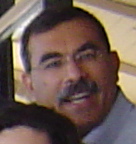Sunil Kumar Ahuja facts for kids
Quick facts for kids
Sunil K. Ahuja
|
|
|---|---|
 |
|
| Born | 13 March 1961 |
| Education |
|
| Scientific career | |
| Fields | Genetics, immunology, molecular biology |
| Institutions |
|
Sunil Kumar Ahuja, born on March 13, 1961, is a professor at the University of Texas Health Science Center at San Antonio. He teaches about medicine, how tiny living things work (microbiology), how our bodies fight off sickness (immunology), and the basic building blocks of life (biochemistry). He is an expert in how our genes affect how our bodies react to infections, especially HIV.
Dr. Ahuja also leads the Veterans Administration Research Center for AIDS and HIV-1 Infection. This center studies HIV and AIDS, especially for military veterans. One of his important discoveries, published in the science magazine Science in 2005, looked at how certain genes, like CCR5 and CCL3L1, can affect how HIV progresses to AIDS in different groups of people. This means some people's genes might help them fight the virus better.
Learning and Degrees
Sunil Ahuja studied medicine at the Armed Forces Medical College in India, earning his medical degree in 1983. After that, he worked towards a master's degree (M.Sc.) at the University of Alberta in Canada. He then completed his medical training, called an internship and residency, at the SUNY Health Science Center at Brooklyn in the United States.
Awards and Recognition
Dr. Ahuja has received many special awards for his work.
- In 2001, he was named an Elizabeth Glaser Scientist and a Burroughs Wellcome Clinical Scientist in Translational Research. These awards recognize scientists who do important research that helps people.
- In 2005, he received the MERIT award from the National Institutes of Health. This is a very special award given to less than 5% of researchers who get funding from the NIH, showing his research is highly valued.
In February 2008, Texas Monthly magazine included Dr. Ahuja on their list of "35 People Who Will Shape Our Future." This shows how important his work is considered.
Scientific Discussions
In science, it's normal for researchers to look closely at each other's findings. In July 2008, Dr. Ahuja's team published research suggesting that a gene called DARC might influence how likely someone is to get HIV/AIDS.
After this, four other groups of scientists tried to repeat his findings but had different results. Dr. Ahuja's group responded in the same science journal, Cell Host & Microbe, and also published another study in 2011 to share more information about their work. This kind of discussion and re-testing is a key part of how science moves forward and helps everyone learn more.

